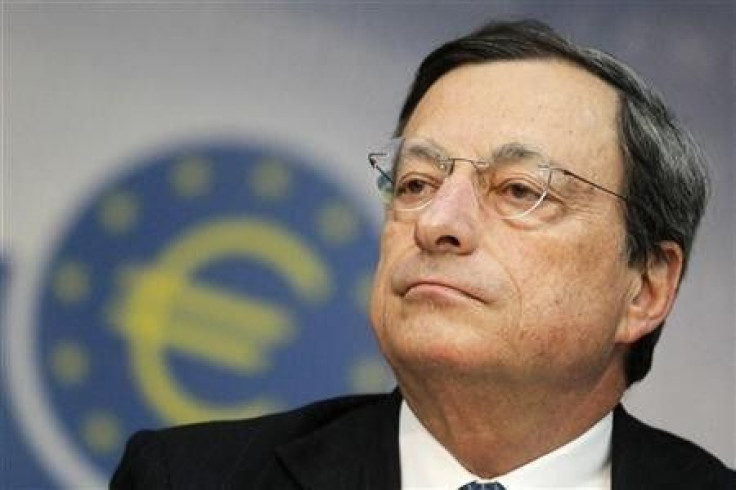Draghi: ECB Agrees Unlimited New Bond Program - OMT
Program will have no cap and not subordinate existing bondholders

European Central Bank President Mario Draghi declared the "euro is irreversible" Thursday and announced a new bond-buying plan aimed at lowering the struggling euro zone countries' borrowing costs and countering market speculation about the break-up of the euro.
The ECB Governing Council agreed on "Outright Monetary Transactions," or OMTs, Draghi told a news conference after the Council's monthly policymaking meeting in Frankfurt. "There is no exact limit for the OMTs, the size is going to be adequate to reach our objectives."
Draghi, who also said the move will not subordinate existing bondholders, said the decision of the Governing Council wasn't unanimous and that there was one dissenter, though he declined to name the person.
The program would focus on the secondary sovereign bond market and Draghi said it was necessary to deal with "severe distortions" in the bond markets, which originate from unfounded fears on the part of investors of the reversibility of the euro. Bond yields have risen in recent months for Spain and Italy, sparking worries the debt crisis was spreading.
"We will have a fully effective backstop to avoid destructive scenarios with potentially severe challenges for price stability," Draghi said, adding that the ECB was acting "strictly within our mandate."
The ECB's program will focus on short-term bonds.
"It's three years because it seemed to us the most effective maturity to target," Draghi said, adding that it was similar to the maturity used for the central bank's two Long-Term Refinancing Operations (LTROs) launched in December last year and February this year.
As expected, the bank refrained from publishing any formal cap on bond yields that it considers excessive.
Draghi emphasized that any bond purchases by the ECB were conditional on governments signing up to a European Financial Stability Facility (EFSF) or European Stability Mechanism (ESM) program, or having already received an EU/ IMF bailout.
Yields on Spanish and Italian government bonds stayed lower on Thursday after Draghi detailed the ECB plan. Yields on 10-year Spanish government bonds plunged 29 basis points to 6.11 percent, while yields on 10-year Italian government bonds fell 13 basis points to 5.38 percent.
The euro erased gains against the U.S. dollar and Treasury prices slid to session lows.
The ICE dollar index, which measures the greenback against a basket of six major currencies, rose to 81.282, from 81.253 in late North American trading on Wednesday. The euro traded at $1.260, off a high of $1.265.
Yields on 10-year Treasury notes, which move inversely with prices, rose 7 basis points to 1.66 percent.
Meanwhile, European and U.S. stock markets rallied.
The central bank forecast a deeper economic contraction for 2012 than it did three months ago. Euro area gross domestic product will drop 0.4 percent this year instead of 0.1 percent, it said Thursday.
"Economic growth in the euro area is expected to remain weak with the ongoing tensions in financial markets and heightened uncertainty weighing on confidence and sentiment," Draghi said. "The renewed intensification of financial market tensions will have the potential to affect the balance of risks for both growth and inflation."
In 2013, the economy will expand 0.5 percent rather than the 1 percent forecast in June. At the same time, the ECB raised its projection for inflation next year to 1.9 percent from 1.6 percent.
"Looking beyond the short term, we expect the euro area economy to recover only very gradually. The growth momentum is expected to remain dampened by the necessary process of balance sheet adjustment in the financial and non-financial sectors, by the existence of high unemployment and by an uneven global recovery."
Earlier, the bank kept its main refinancing rate on hold 0.75 percent. In a short statement, the bank also said it was keeping its deposit facility rate at zero and the marginal lending facility at 1.5 percent.
© Copyright IBTimes 2024. All rights reserved.












